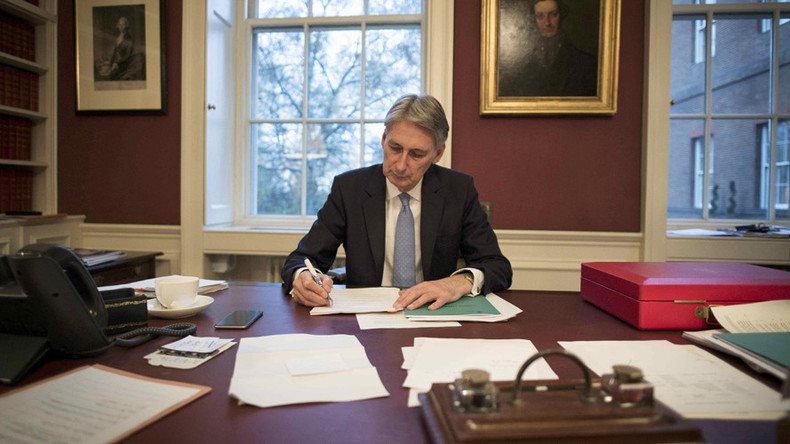Autumn Statement exposes £122bn black hole in post-Brexit budget

Philip Hammond’s first Autumn Statement as Tory chancellor pointed to bleak times ahead, as cost of living is expected to rise, economic growth to slow and Brexit to leave a £122 billion black hole in the country’s finances.
Promises under David Cameron’s government to “balance the books” by 2020 are out the window, with borrowing set to balloon over the next 12 months.
Hammond did though promise some palliative measures to the gloomy economic outlook, including a slowdown of benefit cuts, a small increase in the minimum wage and a new housing program in England.
However, critics believe the lives of British people will become much harder over the coming year.
Brexit black hole
The estimated cost of Brexit has shocked the City, after the predicted bill of £100 billion (US$123 billion) turned out to be even higher – a total of £122 billion between economic losses and borrowing costs.
The deficit has now been placed at £68.2 billion for this year (predicted as £55.5 billion before the Brexit vote) and at £59 billion in the 2017/18 period.
In the Autumn Statement’s small print, close to half a billion pounds has been set aside for the civil service to spend on Brexit alone. The new Department for Exiting the European Union will receive up to £51 million from those funds.
OBR put direct Brexit-related additional borrowing at £58.7bn over 6 years. Or, if you prefer, "£188mn a week".
— Duncan Weldon (@DuncanWeldon) November 23, 2016
And current forecasts don’t even include shortages of migrant labor following Brexit. According to the Office for Budget Responsibility (OBR), “any likely Brexit outcome would lead to lower trade flows, lower investment and lower net inward migration than we would otherwise have seen, and hence lower potential output.”
Current estimates do not count on the possible end of free movement of people, which, as the OBR itself points out, needs to be in the “tens of thousands” for the British economy to stay afloat.
OBR figures suggest that had Britain voted to remain in the EU, it would have saved itself £58 billion over the next five years – or over £225 million each week between now and the next general election.
Slow growth
The official independent forecast by the OBR predicted in March that Britain’s gross domestic product (GDP) would reach 2 percent in 2016, before jumping to 2.2 percent the following year.
But the Treasury’s own calculations hinted on Wednesday towards a much bleaker future, with this year’s positive growth sliding back to 1.3 percent in 2017.
New borrowing forecasts are a cumulative £122B higher over the next five years #AutumnStatementpic.twitter.com/e81xHZKaZH
— Samuel Tombs (@samueltombs) November 23, 2016
“It looks likely that notable downgrades will be built into the numbers for 2017 and beyond too,” said Investec bank chief economist Philip Shaw.
“For one, a weaker investment climate is likely to see GDP forecasts for 2017 and 2018 pitched some way below 2 percent.”
Since 2010, the national debt has risen by £600 billion.
— James Melville (@JamesMelville) November 23, 2016
Tory-led austerity has failed. #AutumnStatementpic.twitter.com/BNh75Nu8kU
Government debt is also expected grow as Hammond officially announced Britain would be borrowing of up to £100 billion in the coming five years.
Wage increase
Hammond’s Autumn Statement included a promise to increase the National Living Wage (NLW) from its current £7.20 per hour to £7.50 in 2017.
The pay rise will amount to an extra £600 per year for some of Britain’s lowest earners, but it only applies to workers over the age of 25. Younger earners are paid at a lower hourly rate.
The move comes in line with Prime Minister Theresa May’s promise to champion the “just-about-managing” or “jam” families in the country.
But at the time of its launch, by former Chancellor George Osborne, the NLW was expected to grow by 45p a year, setting its 2017 rate at £7.65 an hour. Indeed, Osborne’s plans for the de facto minimum wage to reach £9 an hour in 2020 have been downgraded to £8.60 under Hammond’s Treasury leadership.
“The measly rise in the so-called National Living Wage of 30p, leaves 330,000 workers under 25 without even this guarantee,” a statement by the general workers union GMB read.
“The chancellor’s warm words today will be cold comfort for struggling families,” added the union’s general secretary, Tim Roach.
Living Wage Foundation director Katherine Chapman added: “We welcome any pay rise for low-paid workers, especially now in these uncertain times with speculations about food and other prices set to rise.
“The reality, however, is that a fifth of UK workers aren’t paid enough to live on. There’s still a gap between the government minimum and our real Living Wage of £8.45 in the UK and £9.75 in London, which is based on what families need to earn to meet everyday costs.”
Hammond's reported U-turn on Universal Credit cuts is not a U-turn. The Tories are already failing working families in the #AutumnStatementpic.twitter.com/hNxZ49sZ4k
— John McDonnell MP (@johnmcdonnellMP) November 23, 2016
Welfare investment
After long negotiations with No 10, which reportedly wants to alleviate the burden on vulnerable Britons by loosening the strings of the welfare purse, Hammond announced a £1 billion boost to the welfare budget.
Above all the aim is to reduce the rate of benefit cuts, especially from those who are returning to work. Universal credit - the Tories’ new single welfare payment - will be expanded and allow for people in work to keep more cash before tax.
But experts believe the 2 percent taper reduction will not have a major effect on working families, as anyone on the NLW will only get around £250 back a year, and a household earning £30,000 around £500.
Public sector workers still suffer as pay held down & govt departments face huge cuts following #AutumnStatementhttps://t.co/W0emesyGwTpic.twitter.com/NwHPSPBJJE
— PCS Union (@pcs_union) November 23, 2016
Resolution Foundation think tank director Torsten Bell commented on Hammond’s plans, saying: “When it comes to boosting ‘just managing’ family budgets all roads lead to universal credit. The most effective way to support families would be by reversing the £3 billion cut to work allowances announced by the last chancellor.”
A “marginal cut in the taper rate will leave a bittersweet taste among ‘just about managing’ families. Any help is welcome but many will gain no more than £200 from this move,” he said.
“This move falls well short of the rhetoric that ‘just managing’ families have heard in recent months — giving them no jam tomorrow, let alone jam today.”
Homes
The announcements perhaps most widely welcomed on Wednesday were Hammond’s plans to ban upfront letting fees imposed by estate agents across England, as well as a £1.4 billion building plan for affordable homes.
The fees, which can cost around £337 to renters moving homes, currently affect 4.3 million private tenants.
Although celebrated, the move was quickly dubbed a Tory point-scoring exercise. The party was once fiercely opposed to the ban when it was included in Ed Miliband’s Labour manifesto.
#AutumnStatement shows that Tories still more concerned with stately houses than council houses. Wage growth down + housing still a shambles
— Rhea Wolfson (@rheawolfson) November 23, 2016
“This U-turn is a victory for Labour’s campaigning against both the tenant tax and lettings fees,” said Shadow Chancellor John McDonnell during his Autumn Statement reply in Parliament.
Estate agents’ shares plummeted after the announcement, with Countrywide, Savills and Foxtons coming under pressure on the stock market. Shares in Foxtons tumbled as far as 13 points, while Countrywide was down by 7 and Purplebricks by 5 percent.
A further housing policy sees Hammond invest billions into building 40,000 new affordable homes in England and relaxing restrictions on the existing affordable housing budget spending.
“This extra investment will be welcome news for many of the ‘just-about-managing’ families crying out for homes that are genuinely affordable,” said Shelter chief executive Campbell Robb.
“It’s promising to see restrictions on funding relaxed, which should help to build the homes that those struggling actually need - including affordable homes to rent.
“At Shelter we see the impact of our chronic shortage of affordable homes every day, with increasing numbers of people left with no choice but to fork out most of their hard-earned wages on expensive private rents, and wave goodbye to the chance of a stable home.”
Our response to today's #AutumnStatementpic.twitter.com/9FFx8Jxxs6
— Children's Society (@childrensociety) November 23, 2016
But Shadow Housing Secretary John Healey believes the government’s efforts are “too little, too late.”
“Six years of Conservative housing policy has led to the lowest level of new affordable housebuilding in 24 years.”
“The reality is ministers’ deep cuts have left a funding shortfall of over £17 billion compared to the plans I left as Labour’s last housing minister."












